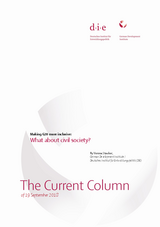The Current Column
Making G20 more inclusive:
What about civil society?
Stauber, VerenaThe Current Column (2018)
Bonn: German Development Institute / Deutsches Institut für Entwicklungspolitik (DIE), The Current Column of 19 September 2018
When this year’s host of the G20, Argentine president Mauricio Macri, attended the opening session of the Civil 20 (C20) at the beginning of August, he said: “Civil society plays a key role in dialogue and consensus-building processes. […] We all must be protagonists and take part in the discussions held by civil society, and not neglect it.” Not all of his G20 colleagues share this view. The CIVICUS State of Civil Society Report 2018 classifies the civic space in only three G20 members, the EU excluded, as ‘open’. Space for civil society in eleven countries is ‘narrowed’ or ‘obstructed’. Civic space in three members is ‘repressed’ and in two ‘closed’, including Saudi Arabia, which will assume G20 presidency in 2020. Argentina’s civic space is categorised as ‘narrowed’. This year, the G20 summit will take place in Buenos Aires on 30 November and 1 December. Can the G20, despite the shrinking space in certain member states, be made more inclusive by enhancing civil society engagement? Legitimacy gap of the G20 Over the last decade, the G20 has become one of the most important institutions of global governance. Its role has shifted from tackling the financial crisis of 2008 to dealing with an agenda beyond financial and economic issues. However, its legitimacy has not grown to the same extent as its importance. Inclusive policy-making by engaging civil society is one way to enhance the legitimacy of governance institutions. Although the C20 is only one of seven engagement groups, it provides a normative horizon to policies and comes closest to representing the diversity of civil society at G20; more than 600 civil society organisations (CSOs) from over 40 countries have contributed to the final communiqué that they presented to President Macri in August. The role of the presidency The case of improving civil society engagement in the G20 is particularly difficult. In its present form, the agenda of the G20 depends heavily on the political will of the presidency. The host government can support or restrict civil society participation and influence the scope and availability of funding provided to the C20 alliance. When China presided over the G20 in 2016, its government did not allow certain domestic and international CSOs to attend the C20 in Qingdao. This year, Argentina mobilised scant financial support to the C20, making it difficult for CSOs from overseas to attend the summit. Making G20 and C20 more inclusive Limited funding contributes to the lack of legitimacy of the C20 itself. Comparatively more CSOs from the Global South lack their own resources, access to funds, qualified staff, and insider knowledge that is required for advocacy work at global stage. CSOs that take part in C20 are mainly delivery-oriented and aim at attaining tangible results, as opposed to resistance-oriented groups that pursue a strong transformational agenda or even completely reject the legitimacy of the G20. Those who protest peacefully or violently at G20 sites do not necessarily sit at the table of the C20 meetings. CSOs active in policy work via C20 or even lobbying the Sherpas usually have a global reach. Such CSOs are predominantly rooted in the Global North, often lacking downward accountability and legitimacy themselves. Although uncritical enthusiasm about civil society influence in G20 is misplaced, C20 remains the strongest channel for civil society to feed more diverse perspectives into the G20 policy process. In order to increase their own credibility as legitimate and accountable actors, C20 and others must still facilitate more participation from actors from the Global South and non-G20 states, in particular, low-income countries and fragile states, and preferably in a lasting manner. Bringing together researchers from across Africa, the Think 20 (T20) Africa Standing Group sets a positive example here. In addition, influential NGOs should be careful not to monopolise civil society, but to include more grassroots organisations and marginalised communities in C20. This would make them also less vulnerable to attacks from illiberal governments that spread doubt about the legitimacy of civil society. Until now, a lack of funding is the major impediment for C20 to overcome these challenges. Therefore, support and funding for C20 needs to be decoupled from the G20 presidency. This would reduce the risk of shrinking space at the national level that jeopardises civil society engagement at the G20. More inter-engagement group cooperation could mitigate the funding challenge, too. Furthermore, cooperation via problem-specific working groups can be a good instrument to influence G20 policy-making by tackling an issue on different fronts and fostering learning effects. In times of globally shrinking space for CSOs, collective action of different non-state stakeholders is necessary to amplify the voice of civil society in G20 – and beyond.

